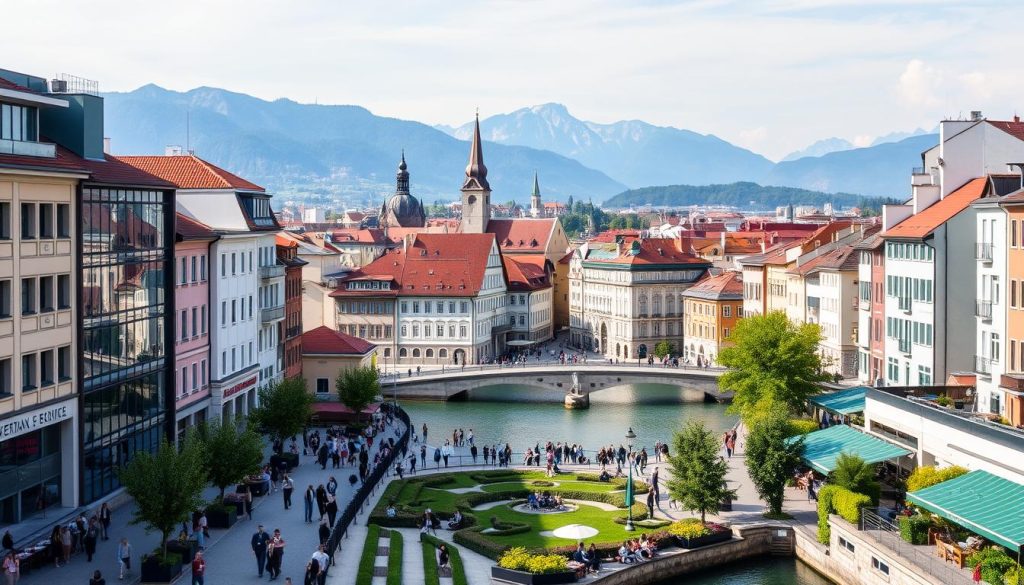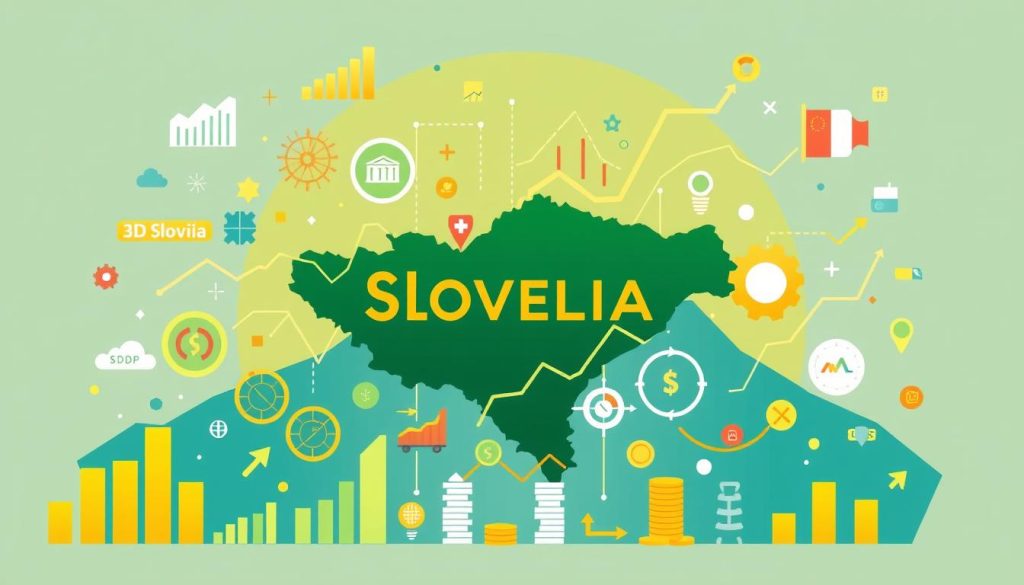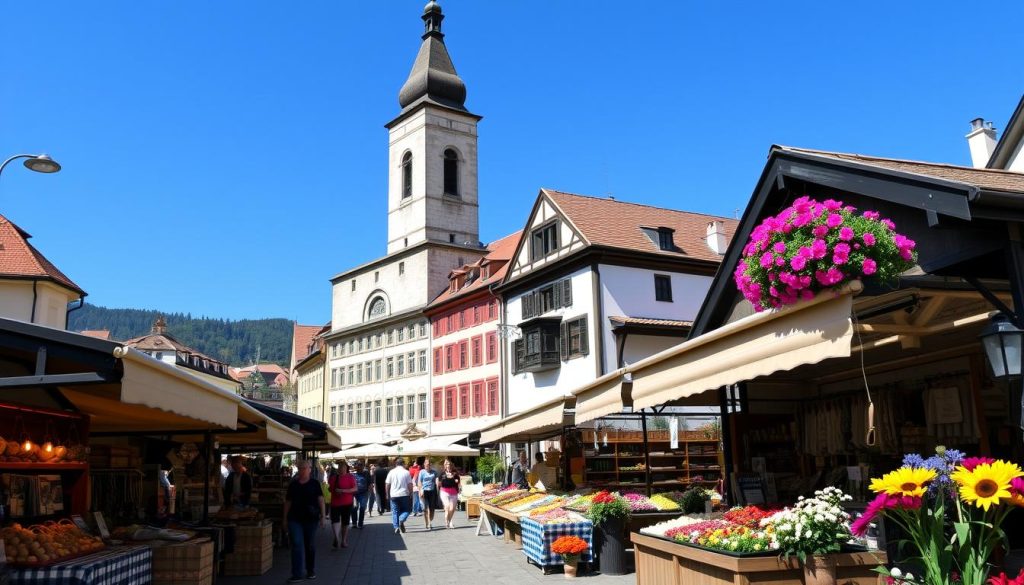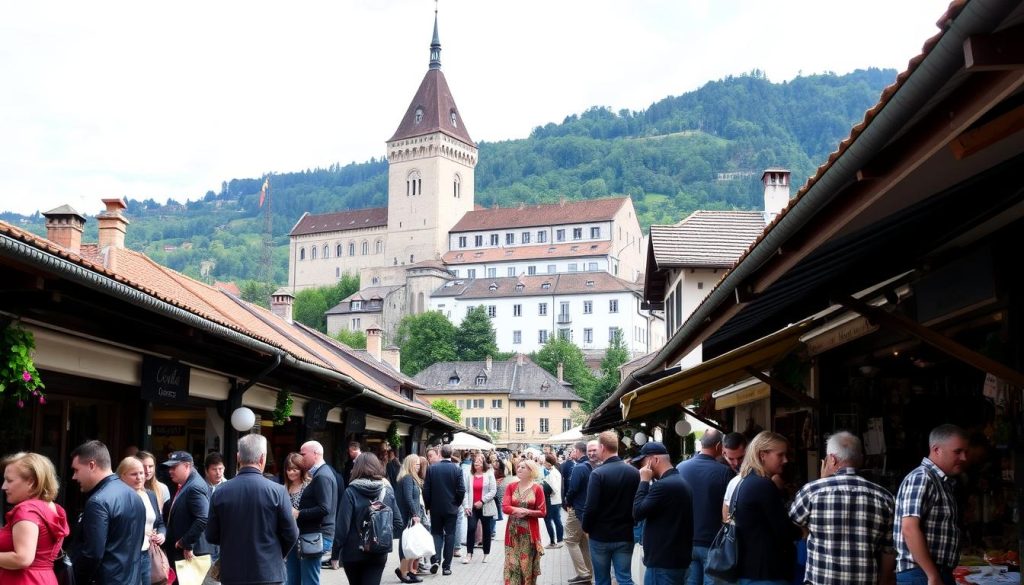Slovenia is becoming a top choice for UK investors and entrepreneurs. It’s important to know how to do business there to succeed. This guide will help you understand the Slovenian market, making it easier to make smart decisions.
We’ll cover everything from the economy to legal rules. Our goal is to help you do well in Slovenia. This way, you can make the most of your investment.
Understanding Slovenia’s Business Landscape

The business scene in Slovenia is lively and varied, offering chances for investors. It’s located at the heart of Central and South Eastern Europe. This spot makes it easy to reach important markets in the European Union.
Slovenia has a strong infrastructure, with good roads and railways. This helps in moving goods and people around. The country’s main sectors are manufacturing, tech, and green energy. It also focuses on innovation and being eco-friendly.
Being part of the European Union is a big plus for businesses here. It opens up more trade chances and makes rules clearer for companies from abroad. This overview shows the great potential for investing and growing a business in this lively country.
Key Economic Indicators for Slovenia

Understanding the Slovenia economic indicators is key for businesses wanting to succeed. The GDP Slovenia shows steady growth. This reflects a strong economy that can handle global changes.
Here’s a brief overview of the important economic indicators:
- Gross Domestic Product (GDP): The GDP Slovenia has seen consistent growth over recent years, signalling a positive environment for investors and entrepreneurs.
- Inflation Rate: Current inflation rates are manageable, which aids in maintaining purchasing power and supports consumer spending.
- Unemployment Rate: The unemployment rate has decreased steadily, promoting a growing labour force that enhances business growth Slovenia.
- Trade Balance: Slovenia maintains a favourable trade balance, indicating robust international trade activity conducive for importers and exporters alike.
These indicators show the current state of Slovenia’s economy. They also point to growth chances for businesses looking to start or grow in Slovenia.
Doing Business in Slovenia: Essential Insights

Getting to know the Slovenia regulatory environment is key for anyone starting a business or investing. It covers many laws and rules that businesses must follow. Knowing these rules and the local business culture can help companies succeed. The way people interact and work together in Slovenia greatly affects business results.
Regulatory Environment
The regulatory environment in Slovenia mixes European Union rules with local laws. Different institutions watch over various sectors to make sure businesses follow the rules. Important laws include the Companies Act for setting up and running companies, and the Accounting Act for financial reports. Entrepreneurs need to understand these laws well to avoid legal problems.
Business Culture and Practices
In Slovenia, business is formal, respectful, and focuses on building relationships. Networking is crucial for building trust with partners and clients. Communication is direct, but it’s important to be mindful of cultural differences. Knowing how to negotiate in Slovenia can lead to better results, as local customs and manners play a big role in talks. Building strong relationships over time helps in working together and achieving business goals.
Navigating Legal Requirements

Starting a business in Slovenia means you need to know the legal rules. New business owners must learn about the documents and steps for registering. This includes applying to the right court or agency, showing your ID, and meeting local or national rules.
The laws for businesses in Slovenia cover many areas. Companies must follow national laws and EU rules. They need to have a business plan, proof of money, and tax registration. It’s also important to know about employment, trade, and consumer protection laws.
Knowing the legal rules helps avoid problems and helps businesses grow. Working with legal experts who know Slovenian business law is very helpful. They can guide entrepreneurs through the legal system.
Types of Business Entities in Slovenia

It’s important to know about the different types of companies in Slovenia if you’re thinking of starting a business. Each type has its own benefits and responsibilities. Here’s a look at the main business entities, including how to set them up, what you’re liable for, and tax details. This will help you make the right choice for your business.
Limited Liability Companies
Limited Liability Companies (LLCs) are a favourite among entrepreneurs. They offer a flexible structure and protect owners from personal liability. To start an LLC, you need to:
- Draft and sign the Articles of Association.
- Register the company with the Slovenian Business Register.
- Get a tax number from the Tax Administration of the Republic of Slovenia.
LLCs are taxed at a corporate rate, making them a good choice for many starting a business in Slovenia.
Joint Stock Companies
Joint Stock Companies (JSCs) are best for bigger businesses looking to raise capital. They allow investors to buy shares, becoming shareholders. This structure protects personal assets from company debts. To form a JSC, you must:
- Prepare the Articles of Incorporation and invite initial shareholders.
- Register the JSC with the right authorities.
- Keep up with ongoing reporting.
Taxes for JSCs can change, and detailed financial reports are key to keeping shareholders informed.
Sole Traders
Sole Traders are the simplest business type in Slovenia. They let individuals work on their own without a separate legal entity. Key points include:
- Low regulatory needs and simple taxes.
- Full personal liability for business debts.
Starting as a Sole Trader in Slovenia is easy, but remember, you’re personally responsible for business debts.
Choosing the Right Location

Finding the perfect business location in Slovenia is key to success. You need to think about things like how easy it is to get there, if there’s a skilled workforce, and the area’s infrastructure. Each place has its own benefits that can help your business thrive.
Ljubljana, the capital, is a top choice for businesses. It’s a centre for international companies because of its great transport links. This makes it easy to reach suppliers and customers. Maribor and Celje are also good options. They offer a more affordable setting but still have good transport links.
When looking at commercial property in Slovenia, remember:
- How close it is to transport, like airports and highways.
- If there’s a skilled workforce in your industry.
- If it’s easy to get to suppliers and customers to save on costs.
- The local business climate and support from authorities.
By looking at these points, you can pick a location that meets your needs. It should also use the area’s strengths for long-term growth and success in Slovenia’s lively market.
Taxation in Slovenia

Understanding taxes in Slovenia is key for anyone wanting to start a business there. Knowing about corporate tax and VAT in Slovenia helps with financial planning. Slovenia has a good tax system, making it attractive for foreign investors.
Corporate Tax Rates
The corporate tax rate in Slovenia is a flat 19%. This rate is good for many companies, helping them financially. Small businesses pay just 9% if they earn less than a certain amount. This shows how Slovenia’s tax system supports businesses.
Value Added Tax (VAT)
The standard VAT rate in Slovenia is 22%. This tax is for most goods and services. But, some items like food and medicines have a lower rate of 9.5%. Companies must follow VAT rules in Slovenia, keeping records and making payments on time. This helps them avoid fines and get the most from their taxes.
Understanding Employment Laws

Slovenia’s employment laws are key to its labour market. They affect how companies hire in Slovenia. Knowing these laws helps employers manage their workforce well. They focus on fair hiring and employee rights.
Hiring Practices
In Slovenia, hiring must follow strict laws. Employers must hire without bias. They need to post jobs clearly and give everyone a fair chance.
They also have to get work permits for people from outside the EU. This makes hiring more complex.
Employee Rights and Benefits
Employees in Slovenia have many rights. They get fair pay, safe work, and health insurance. They also get paid leave.
The law requires a written contract for employees. This protects both sides. Knowing these rights helps create a good work place and keeps employers out of trouble.
Accessing Funding and Financial Support

Getting enough funding is key for businesses in Slovenia to thrive. Start-ups and small to medium-sized enterprises (SMEs) have many funding options. Knowing what financial support Slovenia offers can really help get the capital needed.
There are many ways to get financial help:
- Government Grants: The Slovenian government offers grants to boost innovation and support new businesses. These grants can cut down start-up costs.
- Loans from Local Banks: Slovenian banks have special loans for new businesses. These loans often have good interest rates and flexible payback plans.
- Private Investment: Getting money from private investors can be a big help. It can also bring valuable advice and networking chances.
There are also financial incentives to help businesses grow. It’s important for entrepreneurs to keep up with the latest investment help in Slovenia. Knowing about these options is key for those wanting to start or grow in the Slovenian market.
Entering the Slovenian Market

To enter the Slovenian market well, you need to prepare and plan carefully. It’s important to do good market research Slovenia. This helps you understand what local customers like and want.
With this knowledge, you can make smart choices about what products to sell, how much to charge, and how to promote them.
Market Research Strategies
Doing thorough market research Slovenia is key. It helps you spot chances and avoid problems. Here are some good ways to do it:
- Do surveys to hear directly from people who might buy from you.
- Look at data on market trends and who your competitors are.
- Use focus groups for deeper, more detailed talks.
- Work with local experts who really get what Slovenian customers want.
- Check out reports from local firms that predict market trends.
Establishing Local Partnerships
Building local partnerships Slovenia can really help you succeed. Working with local businesses can give you big benefits, like:
- Access to customers and ways to get your products out there.
- Help understanding local rules and what you need to follow.
- Shared costs for marketing and getting the word out.
- Deeper understanding of Slovenian culture to connect better with locals.
- Chances to work together on projects or share brands.
Networking and Business Development

Building a strong professional network is key to success in Slovenia’s business world. By engaging in effective business networking, entrepreneurs and businesses can find new connections. These connections can lead to many business opportunities.
Here are some ways to improve your networking:
- Join local industry events and trade fairs
- Be a part of professional organisations in your field
- Go to workshops and seminars on business growth
- Use social media to meet local professionals
Slovenia also has well-known groups for business networking:
- The Chamber of Commerce and Industry of Slovenia
- Slovene Business Club
- Slovenian Enterprise Fund
These groups offer great chances for entrepreneurs to share ideas and work together. They help businesses grow and innovate.
Challenges of Doing Business in Slovenia
Starting a business in Slovenia comes with its own set of challenges. Bureaucratic hurdles are a big problem. Entrepreneurs often face delays in getting approvals or dealing with complex rules.
It’s important to know these challenges to plan well. This helps in making a successful business strategy.
Common Pitfalls to Avoid
One big mistake is not valuing local connections. Not building strong networks can lead to missed chances and misunderstandings. Also, ignoring what the local market likes can cause problems with products and marketing.
Adapting to Local Trends
To do well in Slovenia, you need to keep up with local trends. Being flexible and quick to adapt is key. This includes keeping up with trends like sustainability and digital changes.
Knowing these trends helps you stay competitive. It also helps build strong relationships with Slovenian customers and partners.

